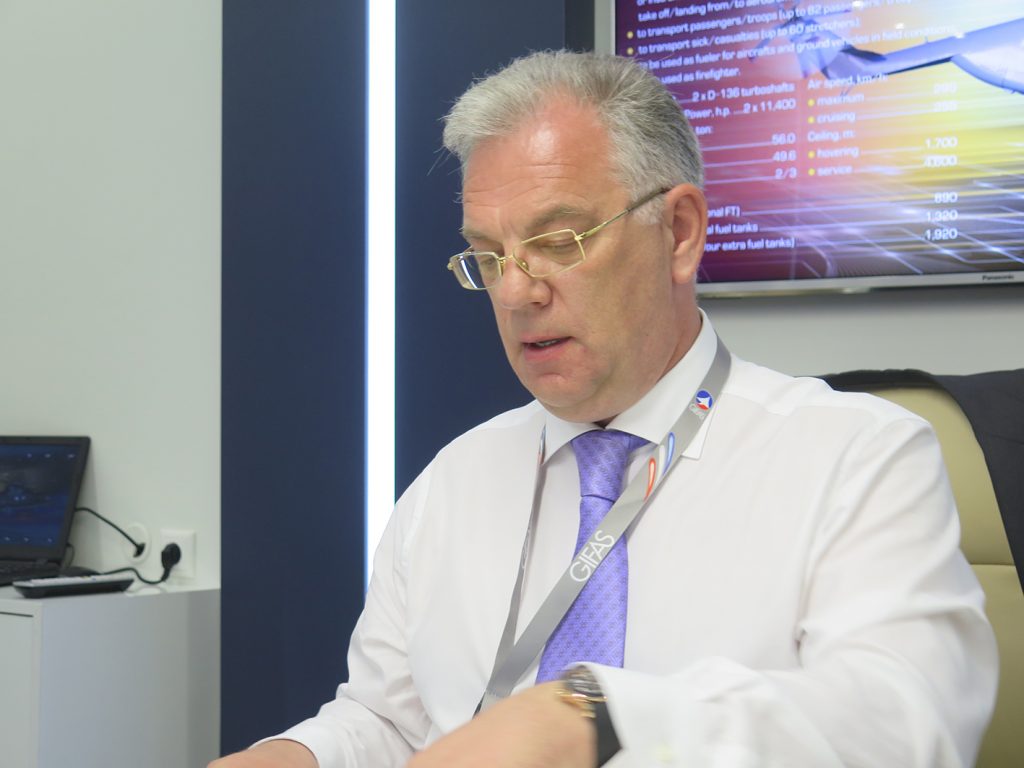The Federal Service for Military-Technical Cooperation of Russia: “We did not burn the bridges”
By David Oliver
The Federal Service for Military-Technical Cooperation (FSMTC) is, until now, a little-known organisation, but it is the powerful Russian government entity for military export policy and control.
Russia is the second largest exporter of military equipment in the world with sales in excess of $15 billion. Of that impressive figure, military aviation products account for 40-50 percent of the total monies earned, with land systems, which include air defence equipment, some 35 percent and maritime weapons and equipment around 15 percent.

The recently appointed Director of the FSMTC, Dmitriy Shugaev told EDR that he expected this trend to continue for the next 2-5 years.
Sales of military equipment comes under a three-tier system with Rosoborronexport, the only state organization in Russia for exporting the entire range of military products, services and technologies, at the top followed by equipment manufacturers which in the aviation sector includes the United Aircraft Corporation, the open joint-stock company with a majority stake held by the Russian Government that incorporates Russian private and state-owned aircraft manufacturers including Mikoyan, Tupolev, Sukhoi and Ilyushin amongst others The third tier includes maintenance, repair and operation (MRO) organisations that support established customers.
According to Dmitriy Shugaev the success of Russian military exports has been achieved by co-operating with long-term partners, improved servicing and support of the products and developing new joint-ventures. The latter has been particularly successful in the helicopter sector citing the joint-venture with India for the production of the Kamov Ka-226 for the Indian Army, and the success in selling the Mi-171 to South American countries including Peru, Brazil and Venezuela. Rosoboronexport currently claims a backlog of 106 military helicopters for Russian manufacturers.
As far as Russia’s fighter aircraft are concerned, deliveries of the high-performance Sukhoi Su-35 are continuing and other Asian customers are in the pipeline. Asked it Russia will compete with the single-engine US Lockheed Martin F-35 stealth fighter, Dmitriy Sugaev said that FSMTC does not design aircraft, that is the responsibility of the UAC, but he did not think that it would.
He went on to say that customers for Russian military aircraft and equipment appreciated the high quality of the products, their excellent reliability and good value for money. Many defence ministries around the world regularly asked the FBST for detailed information and specifications of Russian armaments and equipment. The Afghan armed forces want to continue operating its Mi-171 helicopters which are particularly suited to the country’s terrain and climate. Even the US pilot’s that assist in the training and deployment of the helicopters have been impressed with the Russian helicopter. Dmitriy Shugaev also said that Vietnam has been a long-standing customer for Russian equipment and he expected that to continue in the future.
However, FDST is continuing to look for new markets. We have to be realistic, said Dmitriy Shugaev about making our military equipment companies more competitive. We are already having success in the Middle East and the United Arab Emirates (UAE) in particular and FDST has over 50 offices overseas around the world.
Asked what effect European and US sanctions, that were imposed on Russia following the annexation of Crimea, on Russia’s defence sector, have had on the FSMTC’s export policy, Dmitriy Shugaev said that sanction are unjustified and wrong. Russia is a member of the World Trade Organisation (WTO) under whose rules no restrictions should be placed on global trade. The FSMTC has had to adapt to the situation. He recognised that their companies were facing difficulties but they are having to adjust to the realities. The Russian import subsistence system has reduced spare part from abroad and given impetus to the engine, communications and electronics sectors for Russian manufacturers. Continued working with international partners has increased to solve the sanction issues.
European countries have been forced to forego opportunities of co-operating with Russian projects, and Dmitriy Sugaev said, “we did not burn the bridges. For us, a stable military market is not about sanctions”.
